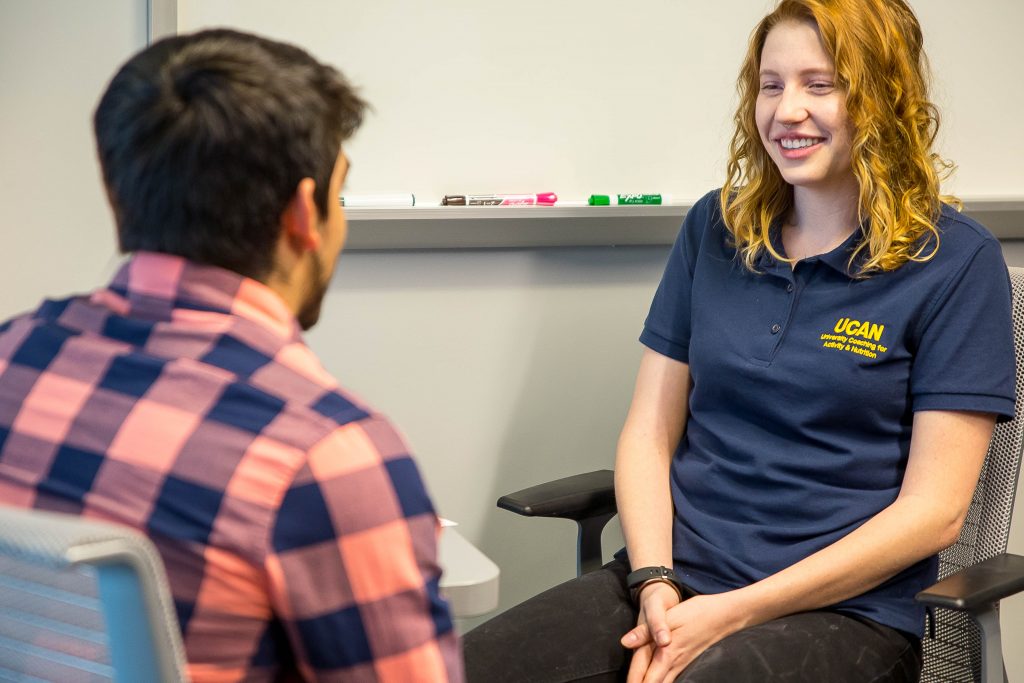July 8, 2019
University life can be an exciting and challenging time. In an environment of change and new responsibilities, students often struggle to balance academic, financial, social and personal priorities—including health and wellness. That’s why Dawn Clifford, associate professor and graduate coordinator in health sciences, began the University Coaching for Activity and Nutrition (UCAN) program last fall.
The program is built on the idea of coaches guiding clients through developing life changes that lead to a healthier, more balanced lifestyle by providing encouragement and accountability.
“I wanted to provide support for NAU students so that as they attempt to make positive changes, they have someone to check in with and be part of their journey,” Clifford said. “College students are often stressed-out, sleep-deprived, eat minimal fruits and vegetables and have a hard time fitting in physical activity. I wanted to create a program that can help Lumberjacks take better care of themselves and receive the individual attention they need to be successful.”
Seeing the progress students have made with the help of UCAN coaches inspired Clifford to expand the program to the wider NAU community. This fall, the same services will be available to faculty and staff. Appointments are available in HLC 4011B for Lumberjacks on the Flagstaff mountain campus or virtually via video chat for online students and faculty and staff at satellite campuses.
The rates for all clients are the same: The first session is free, and additional single sessions are $5. Clients also can sign up for a series of six sessions for $20. Clients plan sessions around their schedules, finding a time up that’s convenient for them. Sessions are arranged to last up to 50 minutes but can be shortened to accommodate busy client schedules. Sign-up is available on the UCAN webpage.
From scheduling to setting goals, UCAN is designed with clients in mind. Each client receives personalized health coaching to fit their individual needs, goals and behavioral challenges or health obstacles. Whether it’s finding ways to have more energy, sleep better at night, eat more healthfully or gain a more comfortable perspective on body image, UCAN coaches are there to help.
Coaches are students, most of whom major in nutrition, fitness and wellness, public health or allied health professions. They receive a minimum of 45 hours of health coach training including in-depth knowledge and skill-building in motivational interviewing. The behavior-change coaching technique is highly effective in helping others adopt health-supportive behaviors, Clifford said. Additionally, training emphasizes practicing compassion and confidentiality with clients.
“Our health coaches are trained to help each client navigate a change in a way that provides the biggest payoff for the client with the smallest disruption in the client’s life,” Clifford said. “People are successful with health and wellness changes when the benefits of changing outweigh the costs or drawbacks of changing.”
Sarah Neville, a master’s student studying public health and nutrition, successfully completed her training and has been a UCAN coach since January. She joined the program to help clients feel more comfortable with their bodies and develop habits that work for them.
“UCAN is a judgment-free zone, and we’re all about breaking down the societal norms revolving around body image and diet culture,” Neville said.
The entire UCAN program, in fact, is built around a more holistic approach to health and wellness. Rather than leading clients to make extreme changes to diet and exercise that can be difficult to maintain and mentally unhealthy, UCAN coaches help them make sustainable changes that nurture their physical, mental and emotional needs.
This philosophy extends to body image, nutrition and physical activity. Clients are encouraged to choose goals that focus less on achieving a desired body type and more on becoming an overall healthier person. Eating more whole grains, fruits and vegetables and finding fun physical activities are the types of changes coaches support clients incorporating into their lives.
“Our clients have enough to stress about. They don’t need to also be stressed about health choices,” Clifford said. “We want the changes that clients make through UCAN to bring them joy, not pain. Behavior changes that cultivate joy are the ones that people stick to.”
For more information about the UCAN program or becoming a student health coach, email Dawn.Clifford@nau.edu or call (928) 523-2566.



